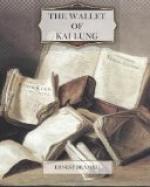“The adventures of the enlightened and nobly-born Yuin-Pel—”
“Have already thrice been narrated within Wu-whei by the versatile but exceedingly uninventive Kai Lung,” remarked Wang Yu placidly. “Indeed, has there not come to be a saying by which an exceptionally frugal host’s rice, having undoubtedly seen the inside of the pot many times, is now known in this town as Kai-Pel?”
“Alas!” exclaimed Kai Lung, “well was this person warned of Wu-whei in the previous village, as a place of desolation and excessively bad taste, whose inhabitants, led by an evil-minded maker of very commonplace pipes, named Wang Yu, are unable to discriminate in all matters not connected with the cooking of food and the evasion of just debts. They at Shan Tzu hung on to my cloak as I strove to leave them, praying that I would again entrance their ears with what they termed the melodious word-music of this person’s inimitable version of the inspired story of Yuin-Pel.”
“Truly the story of Yuin-Pel is in itself excellent,” interposed the conciliatory Hi Seng; “and Kai Lung’s accomplishment of having three times repeated it here without deviating in the particular of a single word from the first recital stamps him as a story-teller of no ordinary degree. Yet the saying ’Although it is desirable to lose persistently when playing at squares and circles with the broad-minded and sagacious Emperor, it is none the less a fact that the observance of this etiquette deprives the intellectual diversion of much of its interest for both players,’ is no less true today than when the all knowing H’sou uttered it.”
“They well said—they of Shan Tzu—that the people of Wu-whei were intolerably ignorant and of low descent,” continued Kai Lung, without heeding the interruption; “that although invariably of a timorous nature, even to the extent of retiring to the woods on the approach of those who select bowmen for the Imperial army, all they require in a story is that it shall be garnished with deeds of bloodshed and violence to the exclusion of the higher qualities of well-imagined metaphors and literary style which alone constitute true excellence.”
“Yet it has been said,” suggested Hi Seng, “that the inimitable Kai Lung can so mould a narrative in the telling that all the emotions are conveyed therein without unduly disturbing the intellects of the hearers.”
“O amiable Hi Seng,” replied Kai Lung with extreme affability, “doubtless you are the most expert of water-carriers, and on a hot and dusty day, when the insatiable desire of all persons is towards a draught of unusual length without much regard to its composition, the sight of your goat-skins is indeed a welcome omen; yet when in the season of Cold White Rains you chance to meet the belated chair-carrier who has been reluctantly persuaded into conveying persons beyond the limit of the city, the solitary official watchman who knows that his chief is not at hand, or a returning band of those who make a practise




